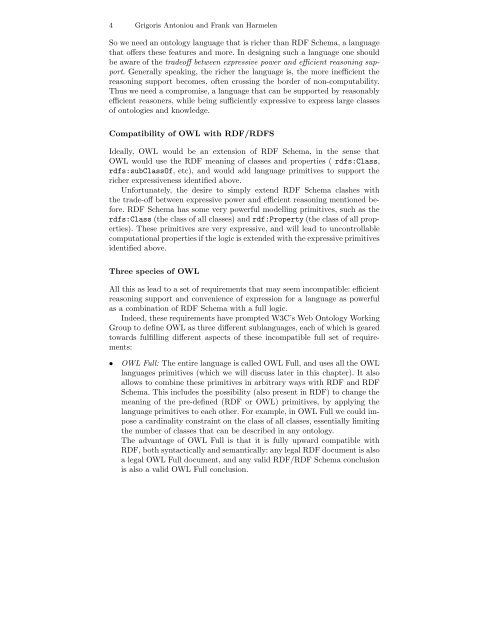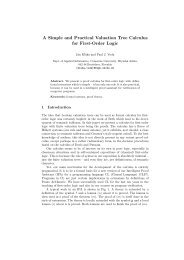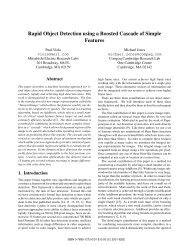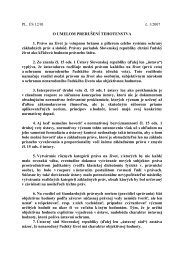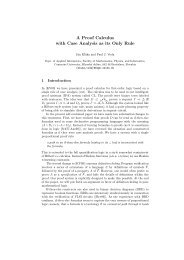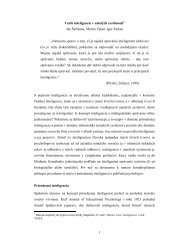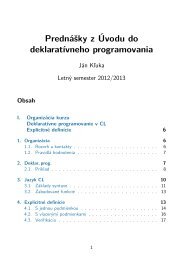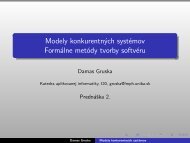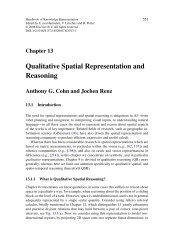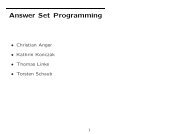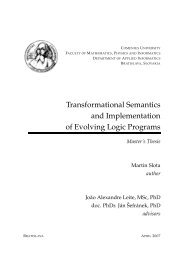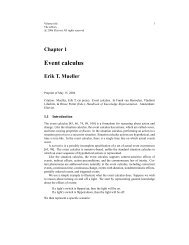Web Ontology Language: OWL - Vrije Universiteit Amsterdam
Web Ontology Language: OWL - Vrije Universiteit Amsterdam
Web Ontology Language: OWL - Vrije Universiteit Amsterdam
Create successful ePaper yourself
Turn your PDF publications into a flip-book with our unique Google optimized e-Paper software.
4 Grigoris Antoniou and Frank van HarmelenSo we need an ontology language that is richer than RDF Schema, a languagethat offers these features and more. In designing such a language one shouldbe aware of the tradeoff between expressive power and efficient reasoning support.Generally speaking, the richer the language is, the more inefficient thereasoning support becomes, often crossing the border of non-computability.Thus we need a compromise, a language that can be supported by reasonablyefficient reasoners, while being sufficiently expressive to express large classesof ontologies and knowledge.Compatibility of <strong>OWL</strong> with RDF/RDFSIdeally, <strong>OWL</strong> would be an extension of RDF Schema, in the sense that<strong>OWL</strong> would use the RDF meaning of classes and properties ( rdfs:Class,rdfs:subClassOf, etc), and would add language primitives to support thericher expressiveness identified above.Unfortunately, the desire to simply extend RDF Schema clashes withthe trade-off between expressive power and efficient reasoning mentioned before.RDF Schema has some very powerful modelling primitives, such as therdfs:Class (the class of all classes) and rdf:Property (the class of all properties).These primitives are very expressive, and will lead to uncontrollablecomputational properties if the logic is extended with the expressive primitivesidentified above.Three species of <strong>OWL</strong>All this as lead to a set of requirements that may seem incompatible: efficientreasoning support and convenience of expression for a language as powerfulas a combination of RDF Schema with a full logic.Indeed, these requirements have prompted W3C’s <strong>Web</strong> <strong>Ontology</strong> WorkingGroup to define <strong>OWL</strong> as three different sublanguages, each of which is gearedtowards fulfilling different aspects of these incompatible full set of requirements:• <strong>OWL</strong> Full: The entire language is called <strong>OWL</strong> Full, and uses all the <strong>OWL</strong>languages primitives (which we will discuss later in this chapter). It alsoallows to combine these primitives in arbitrary ways with RDF and RDFSchema. This includes the possibility (also present in RDF) to change themeaning of the pre-defined (RDF or <strong>OWL</strong>) primitives, by applying thelanguage primitives to each other. For example, in <strong>OWL</strong> Full we could imposea cardinality constraint on the class of all classes, essentially limitingthe number of classes that can be described in any ontology.The advantage of <strong>OWL</strong> Full is that it is fully upward compatible withRDF, both syntactically and semantically: any legal RDF document is alsoa legal <strong>OWL</strong> Full document, and any valid RDF/RDF Schema conclusionis also a valid <strong>OWL</strong> Full conclusion.


